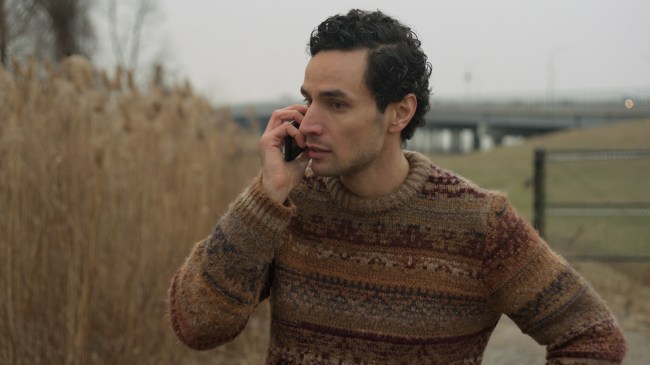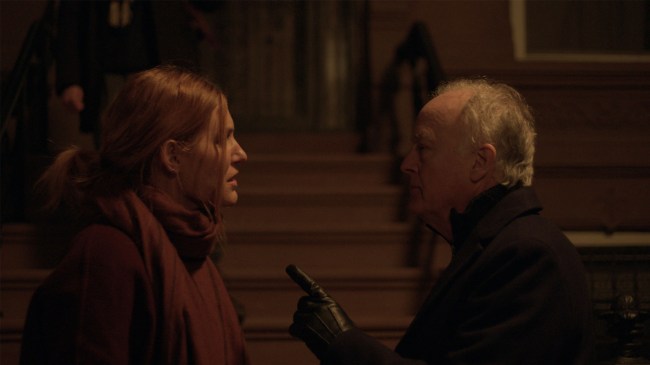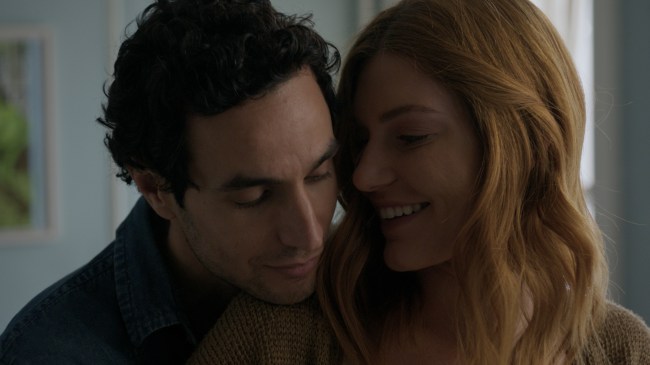



A cascading mood of melancholy that fails to ever snap into a proper tragedy, “If You See Something” may not manage to say all that much about the persistent post-9/11 biases facing refugees from the Middle East in the United States, but director Oday Rasheed (“Underexposure”) takes an admirable swing with his latest narrative feature, delivering a warm-yet-despondent portrait of a couple pushing their allegiance to its absolute limit against the backdrop of a kidnapping scheme they can’t be sure is real.
It begins with Katie (Jess Jacobs) and her boyfriend Ali (Adam Bakri) driving down a busy New York City street as their artist friend Dawod (Haddi Tabbal) monologues in the backseat. Both Ali and Dawod are from Baghdad, and the latter is remembering a car bombing they narrowly missed thanks to his friend’s intuition back home. Ali could not have known he was saving Dawod’s life by not wanting to take a turn into traffic that day, but Dawod has never forgotten it, and he repeats the story with awe. Feeling indebted to someone for something they did in the past is classic fairytale fodder, but “If You See Something” expands that easy idea into a modern meditation on taking hard actions in the name of love, romantic or otherwise.
Co-written by Jacobs and the late Avram Nobel Ludwig, this scrappy indie hits on important political themes at a critical time for immigrants in the United States. Katie and Ali are deeply committed to each other by all accounts, but they’re not getting married to secure Ali a green card. He’s a doctor — and not just “back in Iraq,” as evidenced by the compulsion he feels to perform illegal eye surgery on a little girl in a new country that has yet to legitimize his medical expertise. Ali is the kind of man who does the right thing even against his own interest, and watching him endure a tone-deaf interview with an American bureaucrat stings.

“Of my five best friends from childhood, four of them are dead,” his asylum application reads. In the room, the US agent insists Ali specify how each person passed. Air attack. Car bomb. Shot by American soldiers. Suicide. Juxtaposed with Ali practicing his own identity aloud before facing the stranger who will determine his future (“I am a doctor, I am a doctor, I am a doctor,” he repeats), the scene should be recognizable to anyone familiar with the practices of Homeland Security — simmering injustices and all.
That’s an extraordinary circumstance for dating, and the prospect of standing by your significant other while the government decides if they’re “illegal” could deserve a movie all its own. Art curator Katie walks through a brutal scene that looks like one of Dawod’s installations bringing the wreckage in Baghdad to life for New Yorkers. But a similar scene later in the film suggests Ali walking into a flashback from his own life, and Rasheed smartly keeps the distant nightmare these characters think they know and the one unfolding before them in surreal territory.
“He’s not a local, he lives here,” Katie spits back at her quietly bigoted family when they ask for Ali’s opinion on a conflict from which he’s thousands of miles removed. The moment recalls the core dynamic from Jordan Peele’s “Get Out,” and Reed Birney’s performance as the racist dad has Bradley Whitford written all over it. But this isn’t so much a horror movie as it is a modern myth, and the threat of ICE hangs over Ali like an ever-more menacing Sword of Damocles. When the good doctor gets word that Dawod has been kidnapped back in Baghdad, his dream life with Katie slips away like sand. Dawod’s captors are asking $250,000 for his release, and Ali doesn’t have that. Katie might.

The role radicalized white women have played in terrorism is fertile ground for a film, but Rasheed takes the opposite tact here, painting Katie as an earnest and devoted partner deciding whether she can take this leap of faith with Ali. That’s a solid dramatic question, but one that might’ve been more productive as an inciting incident, as too much of this low-budget drama shuffles around subjects that demand incisive action in 2025, effectively creating a subtle irony that undermines the film’s own point. What’s worse, the acting doesn’t land the gut-punch you’d hoped; Jacobs struggles especially.
And yet “If You See Something” remains urgent in spite of its flaws. Rasheed is known for his guerilla-style filmmaking, and his 2005 docudrama “Underexposure” is widely credited as the first feature to be shot in Baghdad after the start of the Iraq War. At a time when immigrant voices are being diminished in the Western world and the United States’ role in shaping international affairs is being fundamentally reconsidered across the globe, the director’s latest film provides further — if imperfect — proof of how crucial it is to hear from the artists whose communities have been most directly impacted by America’s post-9/11 approach to foreign policy. Even lacking in some respects, this movie’s wide release demands respect, and it promises that resistance to the current administration is percolating all around us, whether we can see it at work or not.
Grade: C+
“If You See Something” is now playing in limited release, and will open in theaters nationwide on Friday, November 14.
Want to stay up to date on IndieWire’s film reviews and critical thoughts? Subscribe now to our newly launched newsletter, In Review by David Ehrlich, in which our Chief Film Critic and Head Reviews Editor rounds up the best new reviews and streaming picks along with some exclusive musings — all only available to subscribers.
Source link

اترك تعليقاً